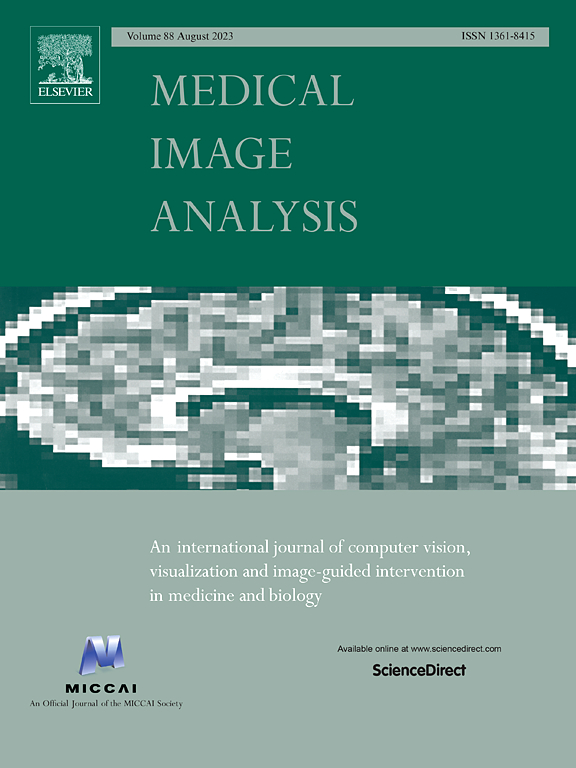ECAMP: Entity-centered Context-aware Medical Vision Language Pre-training
IF 11.8
1区 医学
Q1 COMPUTER SCIENCE, ARTIFICIAL INTELLIGENCE
引用次数: 0
Abstract
Despite significant advancements in medical vision-language pre-training, existing methods have largely overlooked the inherent linguistic complexity and imbalanced issue within medical reports, as well as the complex cross-modality contextual relationships between texts and images. To close this gap, we propose a novel Entity-centered Context-aware Medical Vision-language Pre-training (ECAMP) framework, which establishes a more entity-centered, context-sensitive, and balanced understanding of medical reports to effectively pre-train the vision encoder. We first distill entity-centered context from medical reports utilizing large language models, enabling ECAMP to draw more precise supervision from the text modality. By further incorporating entity-aware re-balanced factor and descriptor masking strategies into masked language modeling, ECAMP significantly enhances the knowledge of entities within the reports. A context-guided super-resolution task is proposed alongside a multi-scale context fusion design to improve the semantic integration of both coarse and fine-level image representations, which prompts better performance for multi-scale downstream applications. ECAMP integrates these innovations together, leading to significant performance leaps over current state-of-the-art methods and establish a new standard for cross-modality pre-training in medical imaging. The effectiveness of ECAMP is demonstrated by extensive experiments on various domains and organs, which achieves cutting-edge results on multiple tasks including classification, segmentation, and detection across 5 public chest X-ray and 4 fundoscopy datasets respectively.
ECAMP:以实体为中心的情境感知医学视觉语言预训练
尽管医学视觉语言预训练取得了重大进展,但现有方法在很大程度上忽视了医学报告中固有的语言复杂性和不平衡问题,以及文本和图像之间复杂的跨模态上下文关系。为了缩小这一差距,我们提出了一种新的以实体为中心的上下文感知医学视觉语言预训练(ECAMP)框架,该框架建立了一个更加以实体为中心、上下文敏感和平衡的医疗报告理解,以有效地预训练视觉编码器。我们首先利用大型语言模型从医疗报告中提取以实体为中心的上下文,使ECAMP能够从文本模态中获得更精确的监督。通过进一步将实体感知的再平衡因子和描述符屏蔽策略合并到屏蔽语言建模中,ECAMP显著增强了报告中实体的知识。提出了一种上下文引导的超分辨率任务和一种多尺度上下文融合设计,以改善粗级和细级图像表示的语义集成,从而为多尺度下游应用提供更好的性能。ECAMP将这些创新整合在一起,使其在性能上超越了当前最先进的方法,并为医学成像中的跨模态预训练建立了新的标准。ECAMP在多个领域和器官上的广泛实验证明了其有效性,在5个胸部x线和4个眼底镜数据集的分类、分割和检测等多项任务上取得了前沿成果。
本文章由计算机程序翻译,如有差异,请以英文原文为准。
求助全文
约1分钟内获得全文
求助全文
来源期刊

Medical image analysis
工程技术-工程:生物医学
CiteScore
22.10
自引率
6.40%
发文量
309
审稿时长
6.6 months
期刊介绍:
Medical Image Analysis serves as a platform for sharing new research findings in the realm of medical and biological image analysis, with a focus on applications of computer vision, virtual reality, and robotics to biomedical imaging challenges. The journal prioritizes the publication of high-quality, original papers contributing to the fundamental science of processing, analyzing, and utilizing medical and biological images. It welcomes approaches utilizing biomedical image datasets across all spatial scales, from molecular/cellular imaging to tissue/organ imaging.
 求助内容:
求助内容: 应助结果提醒方式:
应助结果提醒方式:


